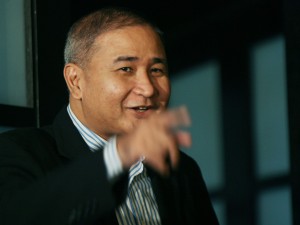Pagcor vows transparency in $4B project
The state-run Philippine Amusement and Gaming Corp. on Thursday reiterated its commitment to undertake its Entertainment City project under the most rigid guidelines and the most exacting standards amid renewed scrutiny from the international investor community.
Pagcor’s reassurance came after its former and current chairmen were accused by a former partner of one of the licensees at its $4-billion flagship project of receiving undue perks and favors from Japanese gaming tycoon Kazuo Okada.
“If they’re saying that one group will be favored over another, that’s impossible,” Pagcor chairman and CEO Cristino Naguiat Jr. said in an interview with the Inquirer. “What we have here is a level playing field among all licensees in the project.”
In particular, he stressed that there was no way he could favor Okada’s Tiger Entertainment over other licensees—Bloomberry Investments, the Belle group and Travellers International—because of a so-called parity agreement embedded in each contract with the investors in the project.
“Under this scheme, every benefit enjoyed by any one investor should also be available to the others,” Naguiat said. “So everyone has equal opportunities here.”
At the same time, the Pagcor chief noted that all four licensees are also bound to the same commitments in the tourism, entertainment and gaming resort complex located on 140 hectares of reclaimed land on the edge of Manila Bay.
He explained that when he assumed the chairmanship of the state gaming regulator and casino operator, the investment rules for each of the four licensees were very lax and flexible.
All of them were bound to invest the total sum of $1 billion in their respective developments but these could be spread out over a 20-year period. As a result of this, he said, many of the investors wanted to fast-track the opening of their casino operations, which offer faster returns on investment, while delaying the opening of hotel operations, which require larger capital outlays.
“When I came on board, I tightened the contracts to require them to spend at least $650 million in the first few years of the project,” he said. “With this also came the requirement for each licensee to put up hotels first before operating a casino.”
Naguiat explained that the rationale of the policy was to make the Entertainment City project a cornerstone of the Aquino administration’s drive to promote tourism in the country, and not just a venue for gaming.
Pagcor is also in the process of selecting a third-party auditor whose role will be to monitor the compliance of each licensee with the “world-class” standards that the agency will require for the project in terms of quality of service for both the hotel and casino operations.

